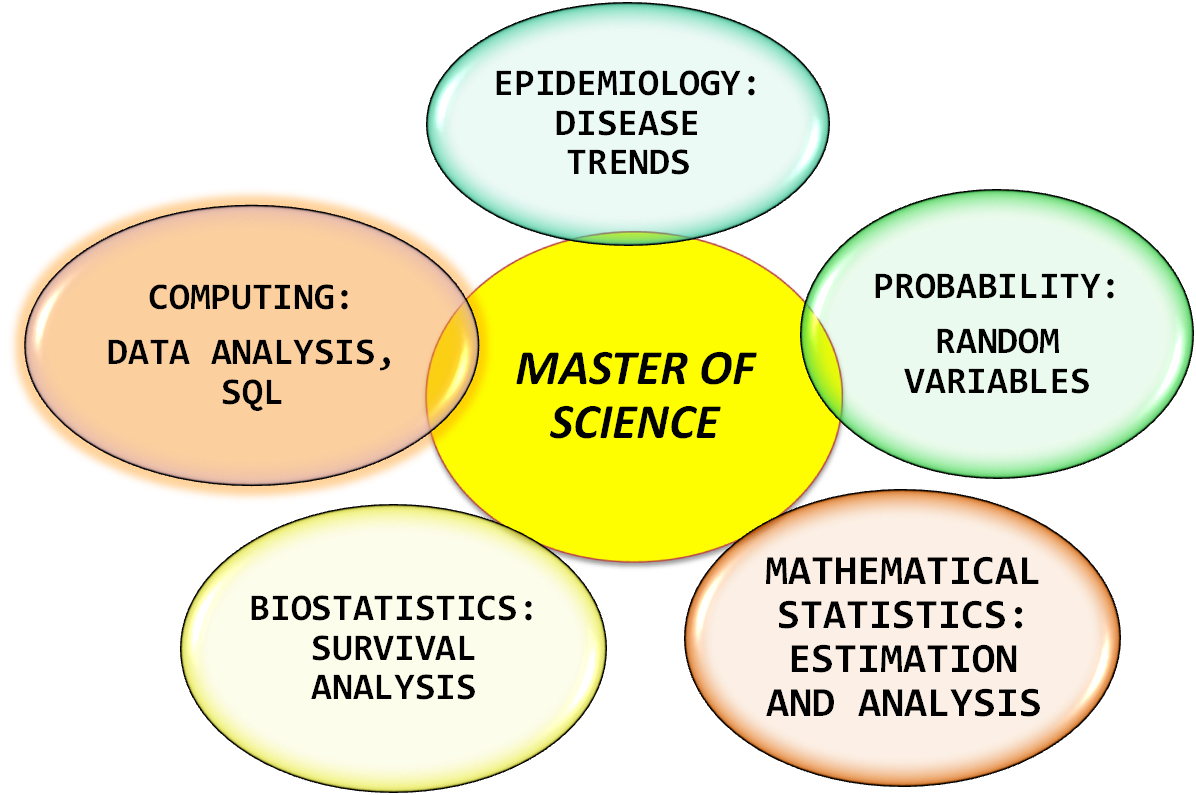The following information is an extension of our article titled-What is a Bachelor’s Degree in Biostatistics? As mentioned in that piece, a master’s degree will provide more job opportunities in this lucrative field. Some employers prefer individuals with a graduate degree. You can seek a career in the burgeoning field of biostatistics in non-profit companies, government agencies, academia, research, consulting, and the private sector. A short list of companies that hire biostatisticians is Johnson & Johnson, Pfizer, Bristol-Myers Squibb, in addition to university medical centers, research foundations, and the U.S. Department of Veterans Affairs. A master’s degree could be your ticket to advance in this lucrative field.
There are several choices of schools offering a Master of Science. Some are available online for those who have work and/or family obligations. An online program has the benefits of continuing work, save money on accommodations, and the convenience of studying in the comfort of home.
The standard duration of a master’s degree is two years, with an average of 32 credit hours or 12 courses. There are a select number of colleges offering accelerated programs — some of which you can complete within as few as twelve months.
In this article, we present examples of classes you can expect. We selected these from a random choice of programs, which will give you a glimpse into the categories you can expect. If you have investigated or are working on a bachelor’s degree in biostatistics, you know that statistics, computing, and biology are at the forefront. The master’s program follows this theme.
The following are examples of courses in a Master of Science.
Probability: Includes the Law of Large Numbers, which is a probability theory based on the premise that a large number of trials generates more predictable results. Random variables, discrete variables, and probability distributions are other topics.
Mathematical Statistics: This topic is on most programs. It involves maximum likelihood estimation, confidence intervals, expectations, multivariate data analysis, and Bayesian estimation and analysis (a type of estimation theory). You may also study the R programming language in this course, which applies to the analysis of data.
Biostatistics: Some programs emphasize biostatistics methods in multiple parts. You see topics as applied survival data analysis, categorical data analysis, data visualization, and multinomial response data. The latter used in probability theory.
Computing: This topic encompasses different subjects, such as statistical computing and statistical analysis system programming. The latter involves data analysis, data modifications, SQL (structured query language for data management), R programming (used in statistical computing), and estimating functions.
Statistical computing enables students to display and summarize data, as well as how to implement the procedures to extract information from data. Students who took courses or a bachelor’s degree in computational science should be familiar with this discipline. Computational statistics is the pairing of computer science with statistics.
Epidemiology: This term is another broad category that applies to concepts used in this science, in addition to its association with public health. You may learn to analyze large public health databases to quantify morbidity trends, disease, and injury frequency, and related epidemiological research material.
Not all college programs include epidemiology in their master’s degree. Some schools may require one course in the subject as part of their graduate degree. If needed, you will likely only take three credit hours.
Thesis and Non-Thesis
Some graduate degrees offer both options. A thesis may entail applying biostatistical principles to areas of research. One particular program requires a minimum of 180 hours in a practicum. Your work in this setting culminates in a research paper, scholarly project report, or dissertation. An advantage of the thesis route is that it may preclude you from taking additional hours of electives.
The non-thesis choice may require a practicum also. In addition to the electives that could amount to six credit hours. Another consideration is whether you must choose a thesis vs. non-thesis before beginning your master’s curriculum. The plan of study might vary depending on your choice from year one.
Master of Arts
One example of this atypical degree exists at Boston University’s School of Public Health. In conjunction with their Department of Mathematics and Statistics, the coursework parallels the science programs. The common names from the BU program feature statistical analysis, data analysis, estimation theory, epidemiological studies, probability, and mathematical computation.
BU may be the only school offering a Master of Arts and a Master of Science in Applied Biostatistics. An example of the few differences is that the latter delves into more complex classes in statistics, such as statistical genetics, Bayesian modeling, and genomics data mining. The science degree also requires 100 hours of research and 400 hours of practical training. Students must write a research paper upon the conclusion of their practice.
Additional Resources
What Classes Will I Have to Take for a Degree in Mathematics Education?
What is the Difference Between a Bachelor’s Degree in Math and a Master’s Degree in Math?
What Kind of Job Can You Get With a Degree in Math?
What Is the Salary Potential for Someone with a Math Degree?
How Advanced Does My Degree in Math Have to Be to Get a Good Job?


